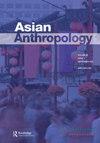非洲语篇与日本语篇:差异的建构与投射
Q2 Social Sciences
引用次数: 0
摘要
摘要本文考察了非洲人在日本的不同表现方式,并思考了这些差异对日本语境中民族-种族类别和话语功能的解释。具体而言,它强调了文化因素在塑造日语话语概念化和处理范畴差异的方式方面的重要性,以及仅从种族或民族角度审视差异的局限性。本文考虑了来自非洲人的数据,这些非洲人自称来自非洲大陆以外的地方,并展示了这些陈述如何阐明动态的文化、地理、社会经济和语境变量,这些变量为日语话语如何构建文化另类提供了信息。在建构这种“他者”的过程中,日本话语以不同的方式将国内身份意识形态投射到外国人口身上,同时也突显了这些意识形态的功能性。本文认为,通过这种方式构建“他者”,日本话语能够在全球框架内重新定义日本国内身份的概念。本文章由计算机程序翻译,如有差异,请以英文原文为准。
African presentations and Japanese discourses: the construction and projection of difference
Abstract This article examines the different ways Africans present themselves in Japan and considers what these differences explain about the function of ethno-racial categories and discourses in the Japanese context. Specifically, it highlights the importance of cultural factors in shaping the ways Japanese discourses conceptualize and engage categorical difference, as well as the limitations of examining difference in solely racial or ethnic terms. This article considers data from Africans who present themselves as being from places other than continental Africa and demonstrates how these presentations elucidate the dynamic cultural, geographic, socioeconomic, and contextual variables that inform how Japanese discourses construct cultural Otherness. In constructing such Otherness, Japanese discourses project domestic identity ideologies differently onto foreign populations, which simultaneously highlight the functionality of these ideologies. This article suggests that by constructing Otherness in such ways, Japanese discourses are able to reconceptualize notions of domestic Japanese identity in a renewed sense within a global framework.
求助全文
通过发布文献求助,成功后即可免费获取论文全文。
去求助
来源期刊

Asian anthropology
Social Sciences-Anthropology
CiteScore
1.60
自引率
0.00%
发文量
25
期刊介绍:
Asian Anthropology seeks to bring interesting and exciting new anthropological research on Asia to a global audience. Until recently, anthropologists writing on a range of Asian topics in English but seeking a global audience have had to depend largely on Western-based journals to publish their works. Given the increasing number of indigenous anthropologists and anthropologists based in Asia, as well as the increasing interest in Asia among anthropologists everywhere, it is important to have an anthropology journal that is refereed on a global basis but that is editorially Asian-based. Asian Anthropology is editorially based in Hong Kong, Taiwan, and Japan, but welcomes contributions from anthropologists and anthropology-related scholars throughout the world with an interest in Asia, especially East Asia as well as Southeast and South Asia. While the language of the journal is English, we also seek original works translated into English, which will facilitate greater participation and scholarly exchange. The journal will provide a forum for anthropologists working on Asia, in the broadest sense of the term "Asia". We seek your general support through submissions, subscriptions, and comments.
 求助内容:
求助内容: 应助结果提醒方式:
应助结果提醒方式:


